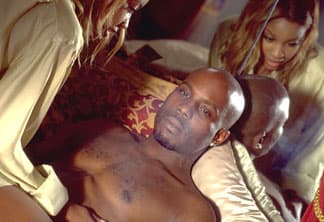After wearing out his East Coast welcome, small-time drug lord King David (DMX) heads to California with a bag of stolen heroin and aspirations of rebuilding his empire. But the King is doomed to repeat his mistakes and continues to destroy the lives that surround him. By the time he returns to New York to make amends, old wounds have festered and karma comes home to roost.
Based on cult writer Donald Goines's novel of the same name, Never Die Alone explores the African-American experience of urban violence and drugs without the overt moral commentary that has characterised similar efforts by directors like John Singleton and Spike Lee.
Despite the King's attempts at finding redemption through confession he records preachy memoirs on a series of audiotapes shortly before his death the storytellers seem indifferent to the content of those confessions. Ultimately, the tapes do little to redeem the character and serve more as a biographic document than as a moral compass for the story.
So where Singleton tends to get the moralising wrong (Higher Learning oversimplifies the issues) and Lee tends to get it right (Bamboozled is poignantly critical of ignorance within black communities), neither Dickerson nor his collaborators seem to have anything to say about all the sadness their story reiterates. As a portrait of the urban condition at its worst, this is a sad reminder, but what does it all mean?
One further quibble: the film's darker sequences seem under-lit and grainy (by cinematographer Matthew Libatique) as a result of trying to fix bad lighting in post-production. Before building his career as a director, Dickerson was an accomplished cinematographer, with credits like Malcolm X and Do the Right Thing to his name. He should have overseen a more professional photographing of his story.
Never Die Alone also features David Arquette as a white journalist who watches the story unfold, and Clifton Powell as a powerful gangster basking in the glory of his bitches and coke. (Fox Searchlight)
Based on cult writer Donald Goines's novel of the same name, Never Die Alone explores the African-American experience of urban violence and drugs without the overt moral commentary that has characterised similar efforts by directors like John Singleton and Spike Lee.
Despite the King's attempts at finding redemption through confession he records preachy memoirs on a series of audiotapes shortly before his death the storytellers seem indifferent to the content of those confessions. Ultimately, the tapes do little to redeem the character and serve more as a biographic document than as a moral compass for the story.
So where Singleton tends to get the moralising wrong (Higher Learning oversimplifies the issues) and Lee tends to get it right (Bamboozled is poignantly critical of ignorance within black communities), neither Dickerson nor his collaborators seem to have anything to say about all the sadness their story reiterates. As a portrait of the urban condition at its worst, this is a sad reminder, but what does it all mean?
One further quibble: the film's darker sequences seem under-lit and grainy (by cinematographer Matthew Libatique) as a result of trying to fix bad lighting in post-production. Before building his career as a director, Dickerson was an accomplished cinematographer, with credits like Malcolm X and Do the Right Thing to his name. He should have overseen a more professional photographing of his story.
Never Die Alone also features David Arquette as a white journalist who watches the story unfold, and Clifton Powell as a powerful gangster basking in the glory of his bitches and coke. (Fox Searchlight)
